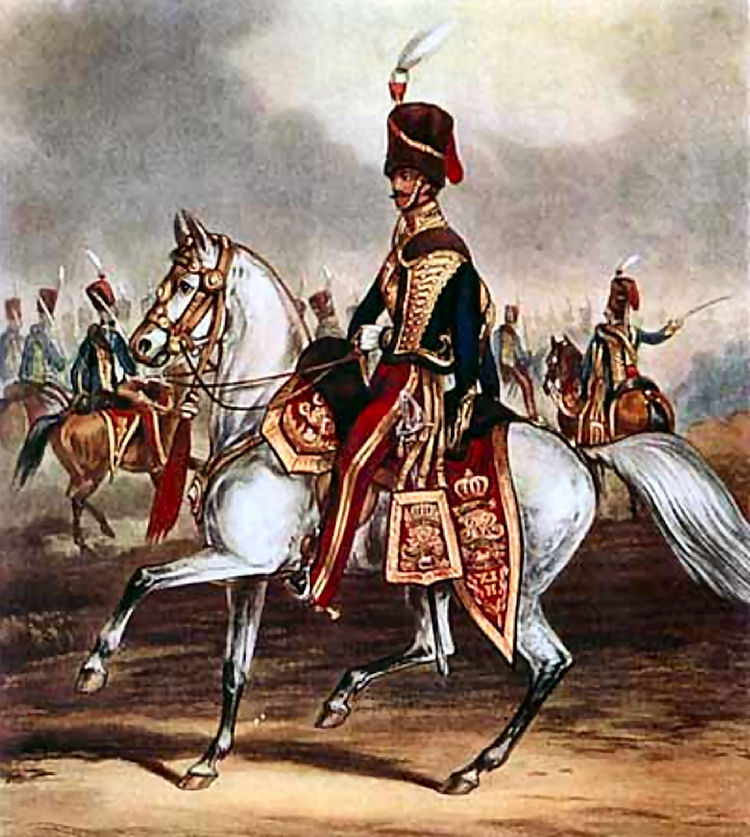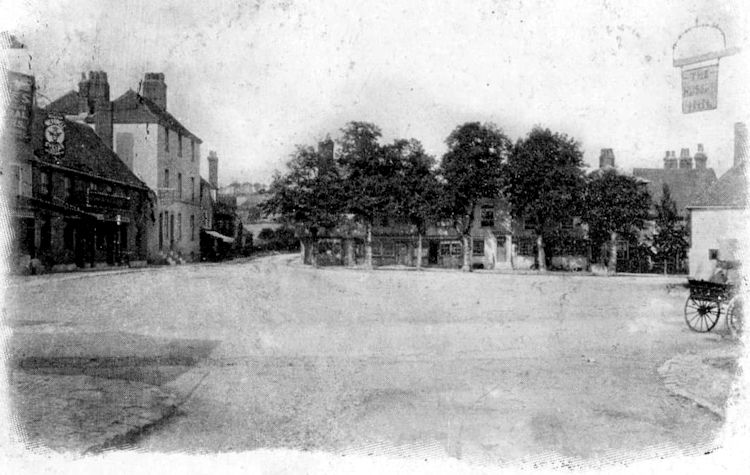|
Kent & Sussex Courier, 30, September 1892.
The Husar, Lenham.
Mr Mowll, of Dover, applied for the renewal of the licence of the above
named house.
Superintendent Holman objected to the renewal on the grounds that the
tenant, Thomas Bramble, was not a fit and proper person to hold the
licence, and that the said premises, in respect of what he held the
licence was of a disorderly character, and frequented by persons of bad
character, thieves and prostitutes. A copy of this notice has been
served on the applicant.
Superintendent Holman being sworn, said that on March 21st, then then
tenant, Robert Goodbody, was convicted of selling beer during prohibited
hours, and fined £2.10s. On the same day he was further summoned for
permitting gaming in his house, and a further fine of £2 10s. was
imposed. The licence was also indorsed. Both offences were committed on
the same day, vis., March 3rd.
I.C. Joy deposed that on the 3rd March, he visited the "Husser," Lenham,
about half-past ten at night. he found two persons in the house with the
landlord and landlady, and he had previously heard long indecent and
disgraceful conversation. He had also seen a Mrs Potter, known to be of
a loose character, and a woman, named Shrubsole, a prostitute, in the
house, and both would go away with young men. He saw this during
February and March. The names of the two men he had spoken of were
Bromley and Turk. The landlord was convicted on March 21st at that court
for selling liquor after hours, and also for permitting gaming. The
licence was also indorsed. The house was also frequented generally by
thieves and prostitutes, and conducted very badly. The roughest element
of the place used the house. All this happened in Goodbodys time.
The Chairman:- What has been the conduct of the house since the licence
was transferred?
Superintendent Holman said the licence has been transferred, and he had
nothing to say against the present tenant.
The Chairman (to Joy):- Do you know that the licence has been
transferred?
I.C Joy:- No, sir, I do not; I am away from there now.
The Chairman:- You speak of prostitutes. Why do you speak of them as
prostitutes? The Constable:- I know them to be prostitutes, and I've
seen them leave the house and go away with young men.
The Chairman:- Have you seen them?
The Constable:- Yes, sir.
Answering Mr. Mowll, witness said that the names of the two women were
Potter and Shrubsole. Both offences for which Goodbody was convicted
were committed on the same day, and the prosecution was the result of
his watching the house. He did not know the present occupier of the
house, and he did not know anything as to the conduct of the house since
Goodbody left.
Superintendent Holman repeated that he has nothing to say against the
conduct of the house since Goodbody left. Since Mr. Bramble had been
there it was well conducted, as he had said in his report.
Mr. Mowll then addressed the Bench. He said that the notice would have
been read, and which had been served on the present tenant, Thomas
Bramble, containing grounds which it was for the police to support in
opposition of the renewal of the licence of Thomas Bramble. The notice
has been served on him, and said that he was not a fit and proper
person, and not of good character, to hold a licence for the sale of
intoxicating liquor. Now they had not once thread of evidence proving
that. On the contrary, the superintendent admitted that he was of good
character and a fit and proper person to have the licence transferred to
him. He considered it was a hardship on Bramble to have such a character
imputed to him, and in support of which there was not the slightest
tittle of Evidence. The second ground of the objection was that the
premises in respect of which the licence was granted were of a
disorderly character. As to that, they had not a scrap of evidence as
regarding the present time. They were taken back to last February, and
he would point out to the Bench they were confined to the four corners
of the notice. He maintained that the notice should have read that
during the tenancy of Goodbody the house was of a disorderly character,
but it said nothing of the sort. It said that it was now of a disorderly
character, but what possessed the Superintendent to say so in the notice
and then say that he had in Court he did not know. Since Bramble have
been there he had proved himself to be a respectable tenant. Thirdly,
the Superintendent said that the house was frequented by thieves and
prostitutes and others of bad character. Here, again, they he had not a
scrap of evidence as to thieves visiting the house. They had evidence as
to two women who have done so, but this was last February and March, and
not during the tenancy the present occupier. Mr Mowll also preceded to
point out that their Worships had temporarily transferred the licence to
Bramble, who had paid the valuation; and if they did not transfer the
licence it will practically put him into the streets. He also wish to
point out that directly the owners of the house (Messrs, Isherwood,
Foster, and Stacey, Maidstone) heard of the complaints against Goodbody
and before he was convicted, they gave him notice to quit and he left
the house. They asked the Bench to take everything into consideration,
to consider the action of the owner's, and the present tenant's
character; and then he did not think that they would see fit to take
away the licence. Mr Mowll then called Superintendent Holman, who said
that the present tenant was a good character, and he proved his
testimonials when a temporary authority was granted him. He had not
heard nothing since to alter his opinions.
Mr Alfred Ernest Keys, managing director to Messrs. Isherwood, Foster,
and Co., Limited, said his company were the owners of the house in
question. He gave Goodbody three months notice to quit on the 8th March.
Up to the time that they heard of the complaints they had every reason
to believe that Goodbody was conducting the house properly. They had an
excellent character with the present tenant, and since he had been in
possession they had had no complaints.
The Bench retired and on their return the Chairman said that the licence
will be renewed to Thomas Bramble.
|
|
The Courier, 10 March, 1905.
The Hussar, Lenham.
Mr. Lance Monkton, solicitor, supported the renewal of this "on" beer
house.
Police Sergeant Martia said the housing question for situated in Lenham
Square. The population was 1,755, and the area 7,144 acres. There were
11 licensed houses in the district - viz. 7 ale, 3 beer, and one "off"
licensed house. The population per house was 159, and there were three
other fully licensed houses within a radius of 40 yards.
Mr. Walter Lewis, the licensee, said he had been in the house for six
years. he had worked up the trade, till now it was a very considerable
house of call for the drovers and waggoners passing by. he had more than
doubled his trade during the last five years. During that time he had
served 4,325 meals. He tried to make his house more like a working man's
home for his customers.
The decisions.
After a retirement of nearly three quarters of an hour, the Chairman
announced the Magistrates decisions as follows:- The "Hussar," Lenham,
renewed.
|
|
Information taken from the
Lenham History Society accessed September 2020.
The Hussar beerhouse. By Amy Myers.
The Hussar beerhouse was sold at auction and its licence revoked on
25th January 1912. By
the outbreak of war in 1914 its premises had become our present post
office run by John
Hughes whose family ran it for many decades to come. However, when the
Hussar sprang
into being is not clear. Its name is an
unusual, but not unknown, name for a
pub. The theory in one Dictionary of Pub
Names is that the name probably comes
from the 11th Hussars

Officers oft he 11th Hussars, ca. 1856.
(Prince Albert’s
Own) Regiment, famous for its part in
the Charge of the Light Brigade in 1854.
Another possibility is that the name of
the Hussar in Lenham stems from the
late eighteenth century when Kent
suffered from the fear of invasion from
France after 1778 when France declared its support for America in its
War of Independence.
All routes to London were carefully guarded and there were many
military camps of which
Lenham Heath was one, with Lenham village becoming a handy source of
off-duty pleasure.
The peace treaty was signed seven years later and Lenham Heath camp was
no longer active.
William Carter, one of the disbanded soldiers stationed there, wrote an
elegy in its honour in
1785, including what might have been a tribute to the Hussar:
'The sun-burnt soldier at an alehouse door
'Pays from his scant purse his last night’s score
'And as his host a parting draught bestows
'The cum’brous belt o’er his broad shoulder throws
'Adjusts his knapsack shakes his landlord’s hand
'His musket grasps and takes his silent stand.
If that alehouse was indeed the Hussar, its publican remains nameless.
More is known of its
later publicans. In 1911 Alfred Pluck was a publican there, and later
he moved on to
Harrietsham. In 1886 as a corporal in the Royal Scots (Lothian) Regiment
he had won a
Good Conduct prize. Unfortunately the words good conduct could not be
applied to all the
Hussar’s publicans. On 30th December 1892 the Kent & Sussex Courier
reported the
distressing case of the then tenant of the Hussar, Thomas Bramble, on
the grounds that he
was not a fit and proper person to hold the licence, as the beerhouse
was frequented by
persons of bad character, thieves and prostitutes. Evidence was produced
to this effect by the
police that ‘the roughest element of the place used the house’. It
seemed an open and shut
case – except that it turned out that the tenant at the time had not
been Thomas Bramble but
27-year-old Robert Goodbody and the licence had since changed hands.
Thomas left the
hearing without a stain on his character and the licence was duly
renewed.
A happier tale is that of the splendidly named Augustus Worledge who was
the licensee in
1907. Born in 1866 in Plymouth, he had married Emmeline Bauckham in the
Medway area in
1906. In 1909 a happy event took place at the Hussar when Emmeline gave
birth to their son,
also splendidly named Augustus.
Today the only visible sign of the history of the Hussar is part of the
word Taproom in the
brickwork that used to be the rear of the beerhouse and is now private
property. In the
Hussar’s time the premises were much larger than they are for today’s
post office, described
in the auction details as consisting of a shop, parlour, kitchen,
scullery, living room, large
club room and four bedrooms with cellar etc. When the Hussar was up for sale, John Hughes
had the choice of buying that or the "Chequers" which was also on the
market. He chose the
old Hussar to be not only his post office but his family home and now
Lenham has both "Chequers" and the post office as thriving and indispensable amenities.
|

